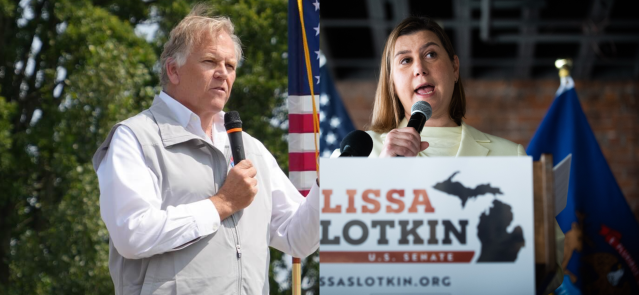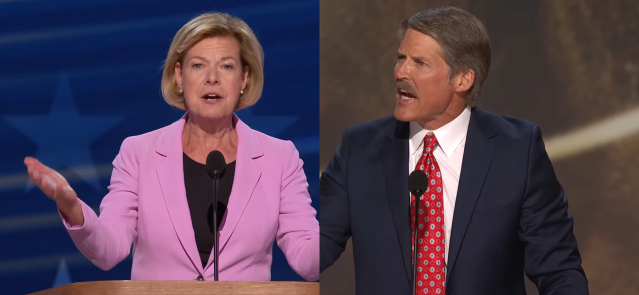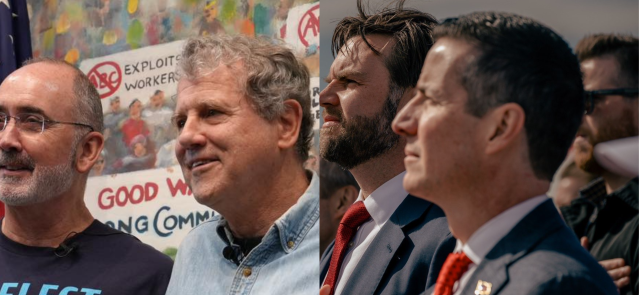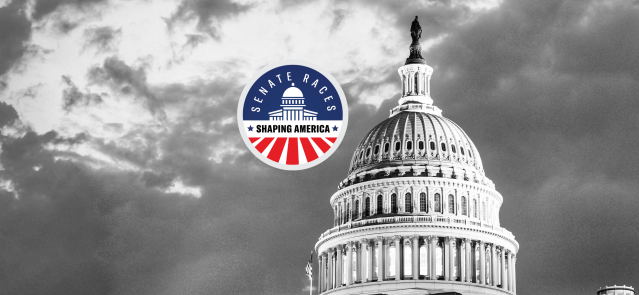Stay ahead of the curve as a political insider with deep policy analysis, daily briefings and policy-shaping tools.
Request a Demo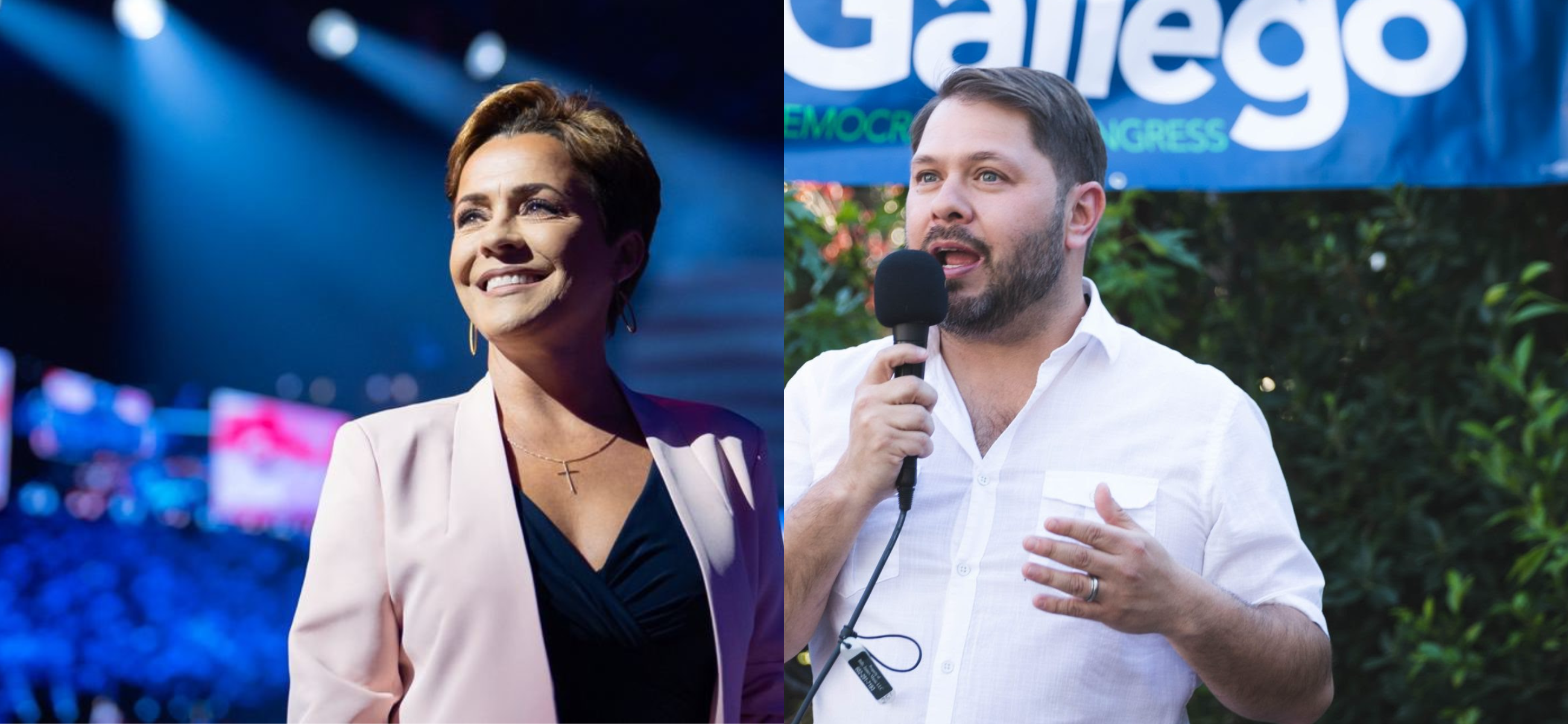
Kari Lake and Ruben Gallego. (Credit: Kari Lake campaign X account; Cronkite News)
PHOENIX — Arizona is purple. Split roughly in three and tinged with shades of red, the voter makeup of the state leaves the 2024 Senate race a dash to the middle.
An open Senate seat left by Democrat-turned-independent Kyrsten Sinema brought out Ruben Gallego, a progressive congressman from a small and assured blue district, and Kari Lake, a onetime gubernatorial hopeful with “America First” allegiance and a streak of election skepticism.
Republicans maintain an advantage over Democrats in terms of registered voters. But consultants across the board put the outcome of the 2024 election in the hands of 1.4 million voters, or about 34% of the electorate, who are untethered to any party.
The bloc has tasked both candidates with striking an equilibrium — keeping their key bases intact while courting, and hopefully capturing, moderate and independent voters.
Consultants say Gallego’s early work casting himself as an even-keeled Democrat with military ties has given him standing among independent voters and allowed him to make some inroads with Republicans. Lake still struggles to appeal to a wider cut of the electorate and mend existing schisms in the Republican Party given her Make America Great Again devotion, ongoing litigation over her 2022 gubernatorial loss and past comments rebuking the moderate wing of her own party.
“You have a massive Republican voter registration advantage. Yet, a lot of those Republicans are still mavericks when it comes to how they vote. They’re willing to split their ballot between the parties,” Matt Kenney, a Republican consultant for national firm Echo Canyon Consulting, said. “In Arizona, you have to appeal to a broad base of support if you’re going to win.”
Image and personality
Gallego, a former state lawmaker and current representative of the 3rd Congressional District, a Democratic stronghold covering the central Phoenix metro area, entered the Senate race early on. During his time in Congress, Gallego wrung a progressive record but accumulated little name recognition.
As he staked his bid for the Senate, Gallego hinged his image on his military record, his upbringing as the son of a single immigrant mother and his rags-to-riches path from a menagerie of minimum wage jobs to a Harvard degree and, eventually, to a budding political career.
Despite facing some uncertainty when Sinema was still considered a potential contender, Gallego proceeded to the primary unchallenged and in the process has courted funding and support from Democrats of all stripes.
Lake, a former local newscaster, came into the political consciousness in 2022, entering the state’s gubernatorial race in a hardline march with Donald Trump’s “America First” brand and policies.
Her campaign was then marked with continued claims of a stolen 2020 election, which later morphed into claims of a stolen 2022 election after she lost to Democrat Katie Hobbs in the general by 17,117 votes.
In the midst of litigating her 2022 election loss, Lake entered the Senate race. She has since cemented her reputation, locally and nationally, as a full-throated supporter of the MAGA message and continually aligns herself with Donald Trump in campaign speeches, in social media posts and on the side of her touring campaign bus.
National issues with local nucleus
In terms of the issues, both candidates retreat to what resonates with their base voters with a goal to paint the other as more radical or extreme.
Lake takes an immigration hardline with a policy reflective of Trump’s talking points on the border. She wants to finish the border wall and promote further enforcement, and continually hits on the “drug cartels” and fentanyl deaths in tandem.
Her campaign ads and messaging have revolved around Democratic inaction and Gallego’s past statements on Trump’s border wall and Gallego’s voting record against certain immigration reforms.
Gallego has moved from calling the border wall “stupid and dumb” in messaging toward the middle, deploying the word “crisis” in describing immigration and redubbing border walls “necessary in certain areas.”
On the flip side, abortion has emerged as a key attack issue for Democrats in the state.
A decision by the Arizona Supreme Court in April to allow an 1864 abortion ban to go into effect and a counter-voter initiative seeking to enshrine a right to abortion in the state constitution lit up reproductive rights and could stand to drive voter participation in November.
During her gubernatorial run, Lake lauded the 1864 ban as a “great law … on the book,” but following the state high court’s ruling, she lodged her opposition and asked for the governor and state lawmakers to find an “immediate commonsense solution.”
On her campaign page, she clarifies she does not support a federal ban on abortion, but that has not stopped Gallego’s campaign from clipping together Lake’s past comments supporting the abortion ban in campaign ads.
Fundraising
Both candidates have seen no shortage of ads, though spending by Gallego continues to outpace Lake. Gallego saw $18.3 million reserved for campaign ads ahead of Labor Day, according to AdImpact, putting the total at $41.3 million post-Labor Day, compared to $17.6 million for Lake.
Lake has continually lagged behind Gallego at each campaign finance benchmark. Gallego, having a head start and an uncontested primary, has banked about $20 million more than Lake in total this cycle.
As of June 30, Lake had raised a total of $10.4 million, while Gallego had brought in about $32 million.
Outside spending, too, has generally tipped toward Gallego.
An environmental group, a Latino voters organization and a veteran-focused political action committee make up some of the larger investments. LCV Victory Fund spent more than $1.7 million in support of Gallego; VoteVets spent over $1.8 million. And he more recently secured a $3 million investment from cryptocurrency PAC Protect Progress.
Stacy Pearson, a Democratic consultant with Lumen Strategies, said Gallego “has got these individual donors who are very local, who don’t want Democrats to lose control of the Senate or at least control of the tie. And he’s got corporate America, the crypto bros, the new economy, the queen- and kingmakers.”
Electoral challenges
The candidates, their funding and the money and choice issues all distill into a voter population with a fluctuating middle.
Voter registration stats as of the 2024 primary show 35% of voters are registered as Republicans, 29% are registered as Democrats and 33.95% are registered as independents.
Republicans turned out at higher rates than Democrats and independents in 2020 and 2022, though. In 2022, 39% of voters were Republicans, compared to 35.5% Democrats and 25.5% independents.
But Republican voters, in this case, do not necessarily mean MAGA voters.
Consultants say moderate Republicans and the independent voting population delivered wins for Democrats who faced off against MAGA Republicans in top state offices in 2022 and could do the same in the Senate race if Lake fails to rein back in all stripes of Republican voters.
Senate polling by Noble Predictive Insights based on surveys conducted from August 12 to 16 shows about 10% of Republican respondents plan to vote for Gallego, leaving Lake capturing 71% of her party. Gallego sees 90% support and a loss of about 5% of Democrats crossing the line to Lake.
“This race might get closer as Election Day approaches and people rush to their partisan camps,” David Byler, chief of research at Noble Predictive Insights, said. “But it’s impossible to look at these numbers and not see real problems for Lake as a candidate, and a real lead for Gallego.”
Kiera Riley is a courts and education reporter for Arizona Capitol Times/State Affairs. Reach her at [email protected] or on X @kiera_riley.
Related stories
Know the most important news affecting Arizona
Get our free weekly newsletter that covers government, policy and politics that impact your everyday life—in 5 minutes or less.
Rogers, Slotkin lean into China, national security in US Senate battle
LANSING, Mich. — Michigan voters are faced with a choice for U.S. Senate in November between two candidates with strong national security credentials but with sharply different views on how to effectively address threats to the U.S. Both Southeast Michigan candidates, Republican Mike Rogers of White Lake and Democratic U.S. Rep. Elissa Slotkin of Holly, have been …
Tammy Baldwin faces tough reelection: Can Trump supporters push her past the finish line?
MADISON, Wis. — Tammy Baldwin may need some Donald Trump supporters to secure her reelection. The two-term U.S. senator plays up the “buy American” language she pushed for federal infrastructure projects and touts policies favored by Wisconsin’s dairy industry such as seeking to ban labeling plant-based products “milk.” Her GOP rival Eric Hovde, meanwhile, wants …
Brown vs. Moreno: Incumbent faces biggest reelection challenge yet
COLUMBUS, Ohio — The 2006 election ushered in a new era of Ohio leadership following 12 years of Republican control. Democrats won back the governor’s mansion and three of the four other executive offices while also narrowing Republican majorities in both chambers of the Legislature. Adding to the blue, near-sweep of top state races was …
4 key Senate races expose internal challenges for parties
This report, “Senate Races Shaping America,” produced by State Affairs reporters embedded in Arizona, Michigan, Ohio and Wisconsin, explores how the presidential race and the U.S. Senate elections in those states could set the stage for the next term and beyond.

